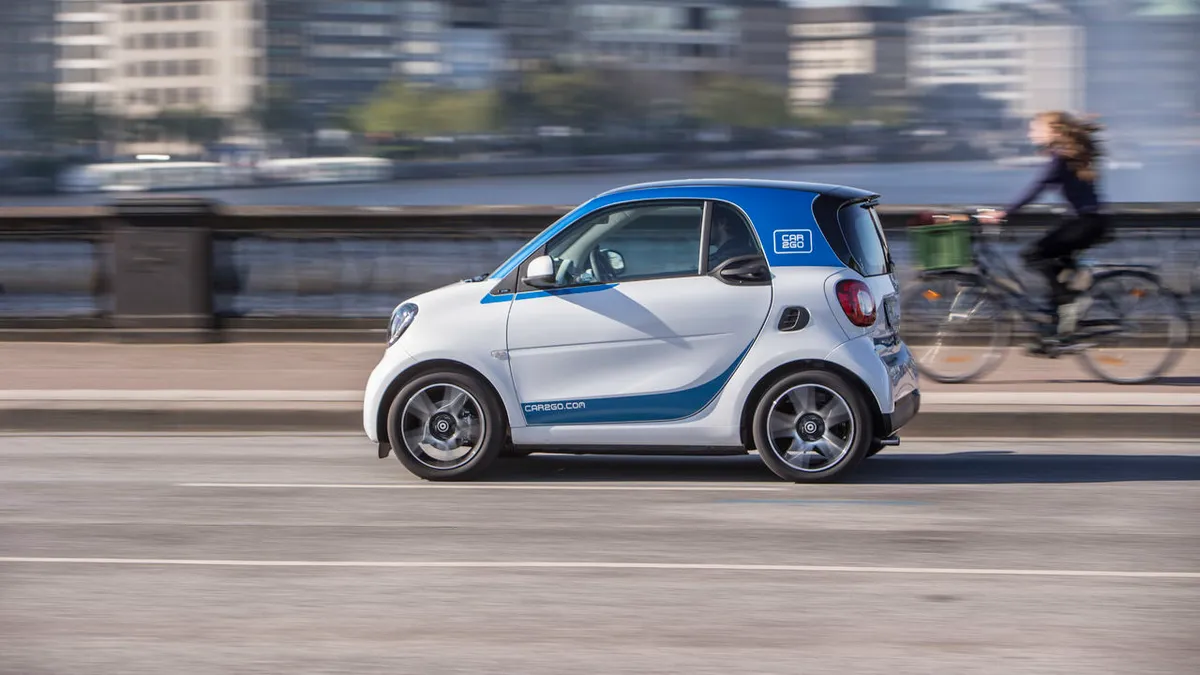UPDATE, June 21, 2018: Car2Go has officially announced it will launch its car-sharing service in Chicago on July 25. The pilot program will support a network of 400 "affordable, eco-friendly vehicles" — including smart fortwos, Mercedes-Benz GLA and Mercedes Benz CLA models — and is expected to run through June 30, 2019.
Chicago Department of Transportation (CDOT) Commissioner Rebekah Scheinfeld said in a statement that this pilot will help CDOT build a robust transportation network, and will enhance the city's "commitment to the Vision Zero traffic safety effort." Alderman Proco "Joe" Moreno has also lauded the program as one that will encourage Chicago residents to give up vehicle ownership, reduce pollution and traffic, and grow the city’s sharing economy.
Car2Go is the city's first and only free-floating car-sharing service.
Dive Brief:
- The Chicago City Council voted Wednesday to launch a pilot of Car2Go, a "free-floating" car-sharing program, in the city’s North and Near South sides. The Chicago Sun-Times reports that the program will launch on May 1 and continue through June 30, 2019 unless the Aldermen vote to close the program at the end of this year.
- Austin-based Car2Go allows customers to pick up a car in a designated zone, use it and then return it somewhere else in that same zone, even if it is a standard parking place and not designated for Car2Go. The Tribune notes it is different from similar companies like Zipcar, which require a car to be picked up from and returned to the same designated place.
- Alderman Proco "Joe" Moreno proposed the pilot program to encourage Chicago residents to give up vehicle ownership, reduce pollution and traffic, as well as to grow the city’s sharing economy.
Dive Insight:
Car2Go already operates in other U.S. cities, including Washington, DC and Seattle. Car2Go will provide 500 cars for Chicago's pilot program, which would restrict parking near the Wrigley Field baseball stadium and the United Center basketball and hockey arena.
While some Aldermen raised concerns about adding traffic congestion — Alderman Tom Tunney reportedly said the strain on parking could be a "nightmare waiting to happen" — the onus is on Car2Go to support the program and be proactive in managing their fleet. Under the terms of the arrangement, Car2Go must balance its cars across the designated area to avoid clustering, similar to bike-share arrangements like Capital Bikeshare in Washington. And while Car2Go will pay a $75 per vehicle fee to park in areas subject to residential parking permits, it will be interesting to see the impact of these new cars on city parking habits.
The pilot has the potential to reduce cars on the street, at least according to transportation experts. A 2016 study of the program from the University of California at Berkeley found each vehicle in the Car2Go fleet removes up to 11 private cars from the road, and that members drive less than private car owners. Whether having such a car-sharing program encourages existing city residents to give up their cars, or encourages newcomers to arrive without one, remains to be seen.
Cities are looking towards shared mobility to help get residents around, and it could offer a new option for Chicagoans looking to expand beyond ride-hailing apps like Uber and Lyft and the mass transit Chicago Transit Authority (CTA). The city was the first to approve a new 15-cent per ride fee on the apps to help fund CTA improvements earlier this year, with DC now following its lead.












